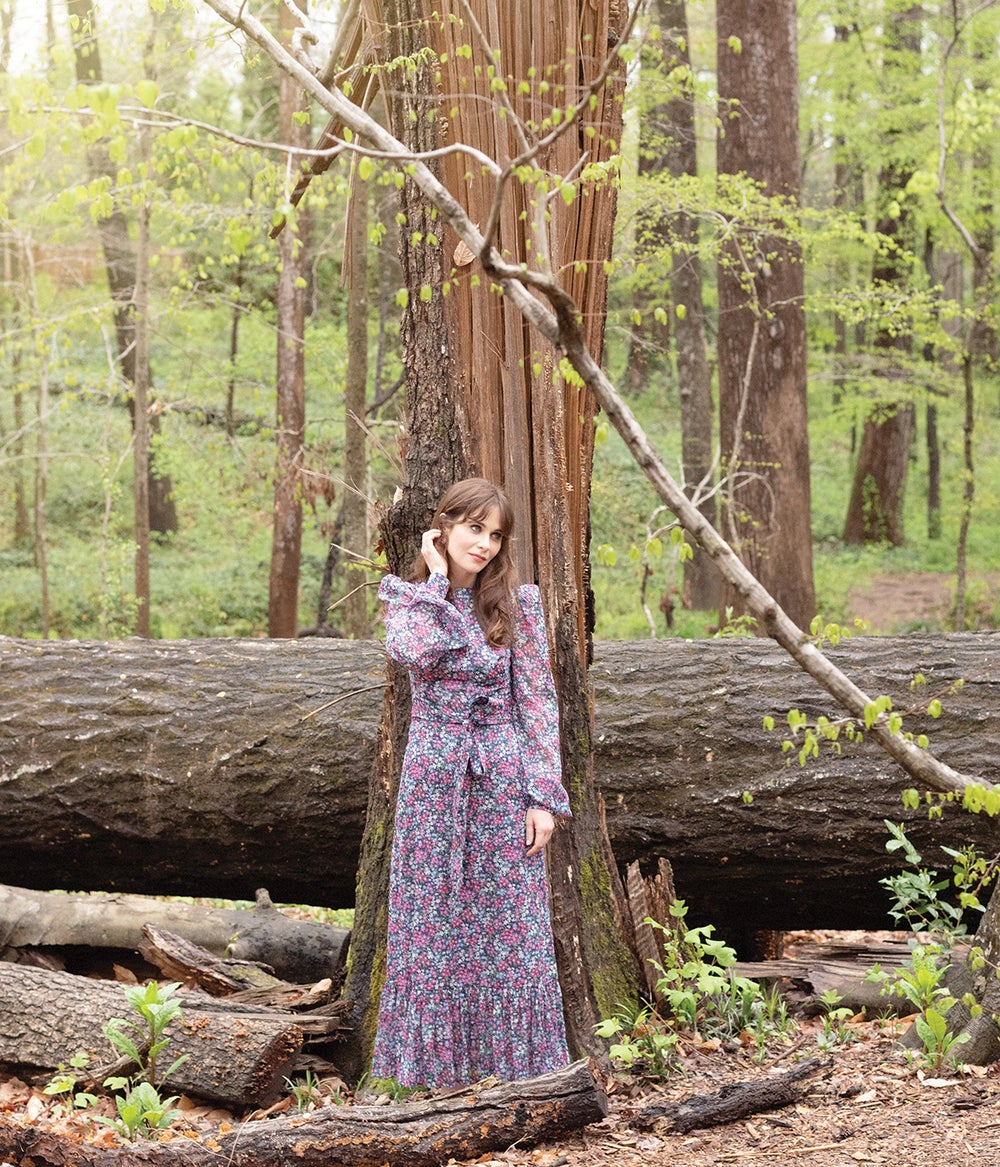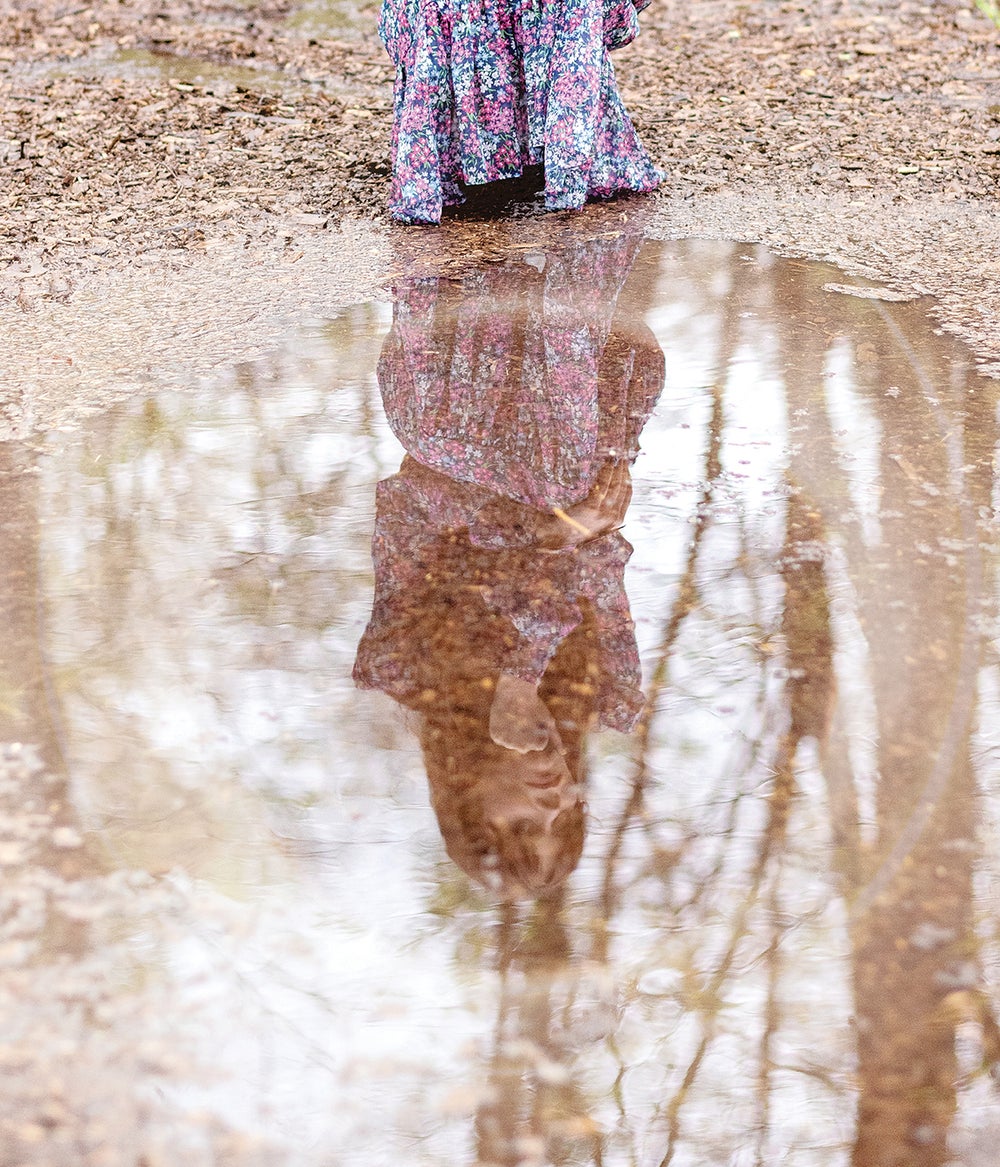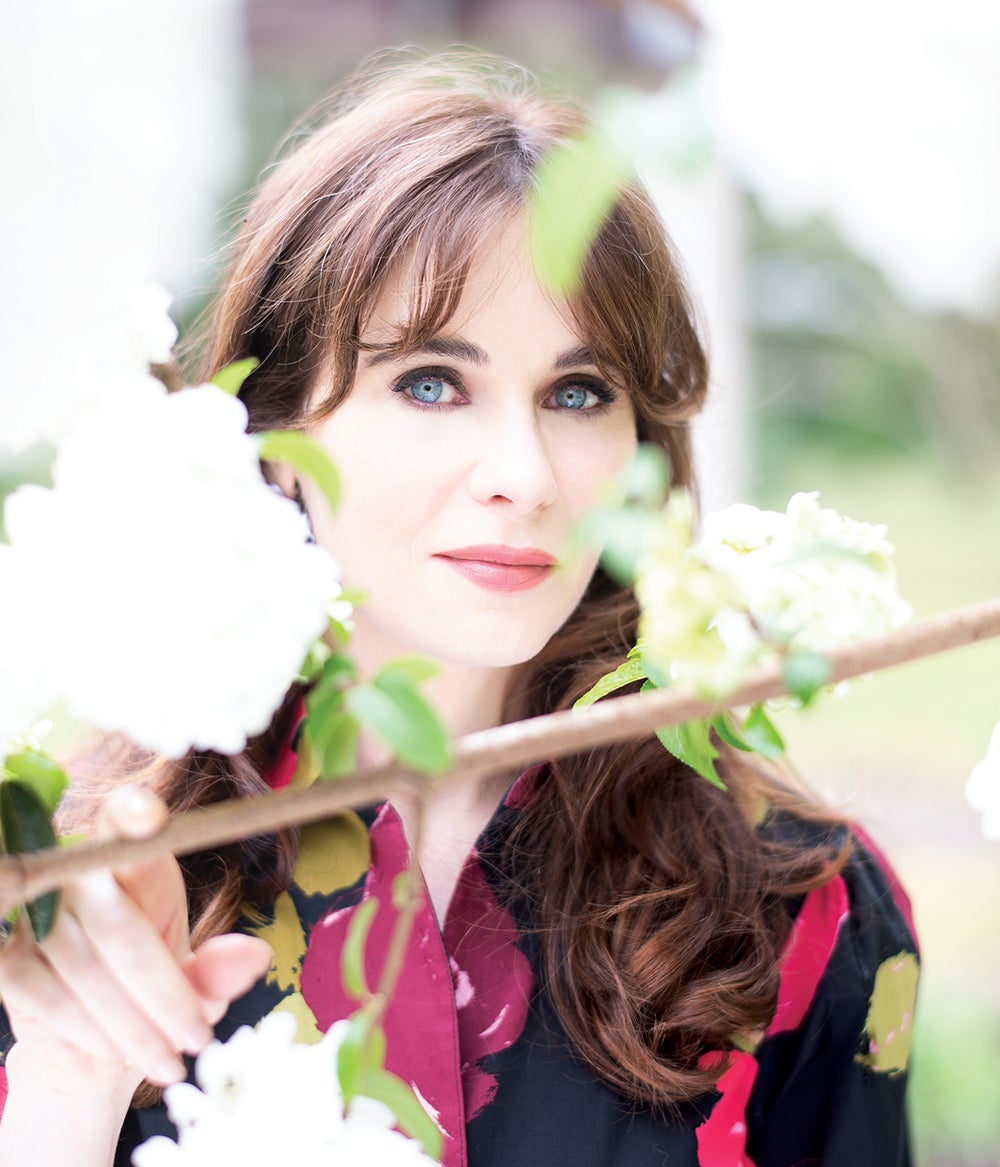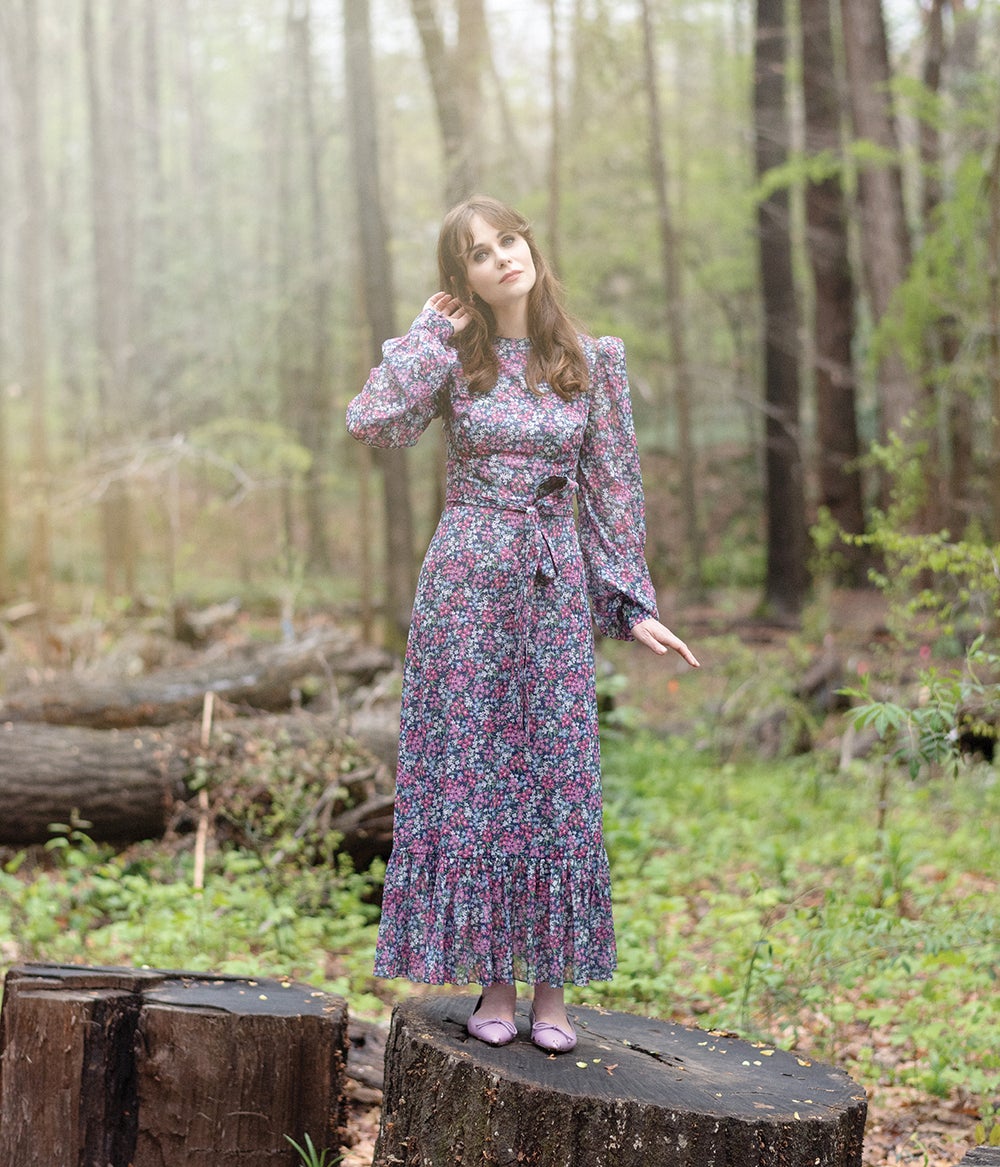Zooey Deschanel Embraces the Word 'Quirky' and Thinks Businesses Should Too The actress and entrepreneur has cofounded enough ventures to know that whatever sets you apart will guide you toward success.
By Liz Brody
This story appears in the June 2022 issue of Entrepreneur. Subscribe »

"I wonder if there's something about me that makes people not want to cast me," muses Zooey Deschanel. She's never been good at auditions — or pitching investors, for that matter. What's driven her success as both an actress and entrepreneur is much harder to quantify or replicate, which is why David Mayer nervously got on a Zoom with her a year and a half ago.
Mayer had been building Merryfield, a platform that incentivizes and rewards people for buying clean, "better for you" products. The business he envisioned would not only give more shoppers access, but also help health and wellness brands reach an entirely new customer base. The question now was how to get Merryfield in front of that wider market to deliver on his promise. The more he looked for the right solution, the more he zeroed in on Deschanel as a cofounder.
Her popularity as an actress was huge — not to mention she starred in his kids' favorite holiday movie, Elf. But she'd also cofounded a media company called HelloGiggles, which sold to Time Inc. for a reported $30 million, as well as Lettuce Grow, a fresh-food startup that's now doing a healthy business. Perhaps even more, Deschanel is known for the kind of relatable, non-judgy credibility he desperately wanted for Merryfield.
Related: Norman Reedus Is Proud to Be the Weirdo-Whisperer: "Flaws Are What Make You Unique"
It turned out to be a good fit. "Obviously there's a series of moments where certain things clicked, but you know, again, I started HelloGiggles with two of my friends — " Deschanel says today, and then she's off, skating into a tangent, which is the way she often operates. Business, body love, food, and privilege—she covers it all, axeling and landing before circling back to the topic that's been obsessing her for years now, which is making good things accessible. And then you realize: It's not a tangent at all, but rather the sum of what drives her as an entrepreneur.
When Deschanel finds something that works, she wants to make it available to everyone. "It's kind of an anti-elitism, I guess," she says. And then it's about getting others to follow that mission by doing things differently, which comes down to what has helped her succeed in so many ways, a quality she's been both praised — and criticized — for during most of her life.
It's the whole quirky thing.

"Someone said I was quirky in college," remembers Deschanel, "and I was like, "Oh, I never heard that word before.'" She promptly went and looked it up.
Since then, "quirky" has followed her like a GPS satellite — through comedic leads and offbeat sidekicks in movies like (500) Days of Summer, Yes Man, and Failure to Launch — not to mention seven seasons of "adorkable" Jess in New Girl and six albums of her indie duo She & Him with M. Ward. It has also clung to her through decades of plunging necklines and disappearing pants as she's stayed full-skirted and high-waisted with cute collars, bows, and bangs. Unbothered, she has owned the word. When Saturday Night Live did a series called "Bein' Quirky with Zooey Deschanel'' featuring Abby Elliott as Deschanel, she claimed the joke and played Mary-Kate Olsen in an electric blanket.
Related: The 5 Vital Rules of Personal Branding
"I'm not a goofball," clarifies Deschanel, 42, who has a steel-toed sense of who she is. "Quirkiness is really just standing out from the crowd. It takes confidence to do something different. And I think as an entrepreneur, you have to have quirkiness to make a business succeed."
She first stepped into that world a dozen years ago, at a Tracy Anderson studio where a lot of celebrities were getting fit. She got to chatting with Sophia Rivka Rossi, a producer on The Hills and The City, which led to lunch and the two talking digital media. These were the days of Gawker and Jezebel, when online magazines were gossipy and snarky. The body acceptance movement had yet to show up. Rossi had been thinking about starting a new kind of media company, and Deschanel saw a gap.
"I'm not saying there's no room for snarkiness, but you can be snarky and kind," Deschanel says. "It was a lot of just girl-on-girl hate, and I tended to be in the center of it. People would make fun of me, trash me. I'm like, "Whatever, I have a thick skin.' But I wanted the next generation to have access to a different narrative."
Rossi and Deschanel teamed up with internet blogger Molly McAleer and founded HelloGiggles in 2011 — a gossip-free site where anyone could write if they agreed to be edited. "We started off with Zooey's ethos and aesthetic, which happened to match mine," says Rossi, now cofounder of Hi Note seasoning mixes. Deschanel contributed content and ideas. Readers loved it, but critics saw the warm, unapologetically girly, vintage vibe — especially Deschanel's — as setting women back. When a Glamour interviewer pressed her on it, she countered, "We can't be feminine and be feminists and be successful? I want to be a fucking feminist and wear a fucking Peter Pan collar. So fucking what?"
Deschanel was not shy about what she wanted for the business either, says Rossi. "She'd go, "I don't like that.' And you're like, "Whoa. Okay.' But she has such a clear compass. And that's really supportive, because when you do something you don't really want to do, everyone pays. The other thing about Zooey is that she's scanning constantly, like, Okay, okay, stay positive."
Related: Jessica Simpson's Billion-Dollar Secret: 'Being Underestimated Is a Superpower'
Deschanel, in fact, practices positivity almost like a discipline. "It's not like I'm just happy-go-lucky," as people assume, she says. "No, I work at it every day. My mom called me "The Great Self-Improver.'"
As a kid, Deschanel remembers discovering how incredibly powerful it was that, with the right mindset, "you could start down and end up." When annoying problems pop up, for example, she'll intentionally frame them as a privilege to solve, something to relish and get excited about. She also embraces the idea that you can feel two ways (like angry and grateful) at the same time. And then there's empathy. If someone suddenly changes her shooting schedule, instead of dwelling on what she now can't do, she thinks about all the things on that other person's plate, which makes it hard to be angry.
Despite the haters, HelloGiggles — with its fresh, casual, and inclusive voice — turned out to be exactly what a lot of young women wanted. It was drawing 20 million unique visitors a month and had a staff of 45 when then-magazine giant Time Inc. bought it in 2015.

Around the time that deal went down, Deschanel became a mother with her now ex-husband Jacob Pechenik. They'd met the previous year on the set of Rock the Kasbah, where he was producing and she was playing a struggling singer alongside Bill Murray and Bruce Willis. "It was," he says, "the sixth or seventh, I can't remember, worst film of all time, according to how much money it made in box office compared to the marketing budget." The two bonded over it, and when she got pregnant, they started talking about eating healthier.
The same way Deschanel had been adamant that you didn't need money to be a HelloGiggles girl, she started obsessing about the disparity in who could afford Whole Foods and organic produce. Any mother would want the best nutrition for their child, but healthy food seemed to be a luxury. Pechenik shared her curiosity but came at it from a systems perspective. He'd previously founded two tech companies that made supply chains and derivative trading more efficient. Now he started to question why it takes days, even months, for produce to go from the farm to the grocery store bin, all in a process that bleeds the food of nutrients and pumps out emissions as trucks eat up highways to get it there.
Related: Why Fit In When Your Business Can Stand Out
As the couple learned more, they tried to construct a solution that would cut out as many middlemen as possible. No more transportation. No more store, even! What if consumers could grow food at home? they wondered. The trick would be to make it easy for busy people with no time or space for a garden.
In 2017, they launched their answer: a company called Lettuce Grow. Its first product is the Farmstand, a shapely hydroponic system that waters and fertilizes itself. Made of as much recycled plastic as possible, it twists together with modules so customers can adjust the size and use it indoors or outdoors. Once they plant any of the 200-plus seedlings the company cultivates — everything from arugula to watermelon — they only need to tend it for five to ten minutes a week to keep it growing.
"After we started," Deschanel says, "people from gardening columns would call and say, "I want to interview you.' I'm like, "No, I'm not a gardener! I want to sit in a garden. I don't want to be gardening. But I do want that fresh food.'"
It's been a long ride, personally and professionally. "There was a time we were going through our divorce, and it was like, "Maybe this is more like my thing,'" says Pechenik, who admits he wouldn't do another startup with a family member. "But actually, our friendship and her support of the businesses has grown." Lettuce Grow, too, has grown. Thanks to the help of a Series A funding round last year, it has now invested in five seedling farms and — with a team of 70 and a new product on the way — it plans to expand internationally.
The company's challenge now is coming up with more creative financing. Farmstand costs $400 to $700, and at the high end of that range pays itself off within ten months (based on the savings of eating homegrown food). But Pechenik and Deschanel know that not everyone can afford the upfront cost. Without solving that, they haven't served the company's core mission of accessibility. So they're now exploring options like a subscription model and lobbying for tax incentives for people who grow their own food, similar to those for solar power.
"When we were first pitching it, we didn't have anybody who would invest," says Deschanel, who bootstrapped it with Pechenik, "and now I kind of want to go back and be like, "Are you guys kind of mad you didn't?'"
It reminds her of the Hollywood auditions. "People today are mostly casting me on my body of work, but on the rare occasion I do audition for something, I never get it. And I would like to challenge [them], because I always think I do a good job, but then for whatever reason…" She trails off, laughs at herself and the audacity of it all, and wonders if maybe she talks too much. "It's just something I make jokes about now."
Then she moves on to what works, instead of what doesn't.

Toward the end of 2020, Merryfield showed up. As it turns out, Mayer, like Deschanel, had an awakening when he became a parent. He'd spent years in the investment world, and at 42, stood holding his daughter in his arms and started to see the world through an entirely new lens. He watched people shop at Whole Foods, go to SoulCycle, and drink green juice as "almost this alternative healthcare system," he says. As for everyone else trying to raise families who couldn't afford it? He began asking the same questions Deschanel was trying to answer.
Mayer first partnered with Joe Dickson, who'd been director of quality standards at Whole Foods for 14 years, and then went searching for a third cofounder to round out the team.
Related: How to Set Yourself Apart From the Competition
That's how they all ended up on a Zoom call with Deschanel. "As soon as they told me what his idea was," she says, "I was on board." By then, she'd come to realize that even if Lettuce Grow became as ubiquitous as the refrigerator, it wouldn't solve the entire food access problem "because say you grow 20% of your food at home; what about the other 80%?"
Merryfield, she realized, could cover that larger piece. On the call, she got especially fired up about the idea of helping people vote with their dollars to demand even more of these good brands — and bring the price down further. "It's a domino effect!" she says.
Where Lettuce Grow turns people into farmers, Merryfield takes on the shopping side. But it does it in a unique way — functioning more like a membership and loyalty program than an e-commerce platform. Shoppers simply buy whatever they want online or at their local grocery store. Then, they scan their receipt into the Merryfield app and are rewarded for purchasing any brands in the program — companies like Stonyfield Organic, Vital Proteins, LesserEvil, and NadaMoo! that are vetted for safe, quality ingredients and responsible practices, so that no one has to navigate the rockslide of marketing information. Every purchase earns points that are redeemable for gift cards at places like Amazon, Sephora, and Target. Users save at least 5%, but often much more.
While the membership costs nothing for shoppers, companies pay an annual fee to be included in the app. Why would they do that? "For brands today, it's very expensive to reach new customers," Mayer says. "The big opportunity for those in the wellness space is not just increasingly trying to double down on the same audience they've been marketing to for the last decade," but instead to expand their audience. He also hopes to show that Merryfield builds loyalty because consumers are more inclined to shop the whole portfolio of brands, which adds a stickiness to the relationships.
Related: Branding Is More Than an Accessory: It's the Foundation of Any Business
Like Lettuce Grow, Merryfield is set up as a public benefit corporation, which Deschanel has strong feelings about. "Nonprofits are absolutely essential," she says, "but I lived in the former Yugoslavia for several months growing up and I think a little bit of capitalism can put a fire beneath you and get the best minds. My dad stepped on a [poisonous] stonefish, and if you've never been to a communist hospital, I just have to say it's a good thing to see."
With only three or four months of serious marketing under Merryfield's belt, how well it can deliver on customer acquisition remains to be seen. But with 65 brands on board today, Merryfield expects to reach 100 this year and has ambitions to expand to other categories like meditation apps, gym memberships, and restaurants — the whole "wellness economy," as Mayer puts it. "The brands love her," he says of Deschanel. "She thrives on positive energy, and that can be contagious."

These days, Deschanel is putting that positivity into practice at every turn as she collects miles flying between Los Angeles and Atlanta filming Harold and the Purple Crayon, gears up for a tour this summer with She & Him, juggles two children ages four and six, and works on the two startups — all while making time to go to "a ton" of escape rooms with her boyfriend, Property Brothers' Jonathan Scott. "It's one of our favorite things to do," she says. "We love to solve puzzles."
At one point while discussing her businesses, Deschanel steps back. "It's funny," she says. "I don't think of myself as an entrepreneur, exactly, because I've worked with all these amazing CEOs who really make these companies happen. I'm risk averse. And I didn't go to business school or anything like that. But…" And then you can see that positivity discipline in action — which, let's be honest, is one of the most essential entrepreneurial skills of all. "I have a lot of good ideas. I bring my creativity. And vision."
Not to mention quirkiness. "You have to do something different," she says.








